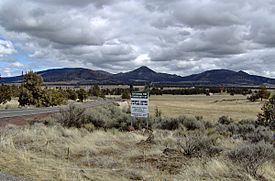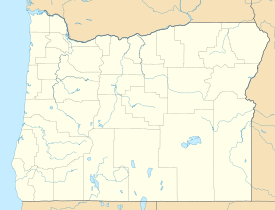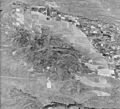Powell Buttes facts for kids
Quick facts for kids Powell Buttes |
|
|---|---|

Powell Buttes seen from the west
|
|
| Highest point | |
| Elevation | 5,216 ft (1,590 m) |
| Geography | |
| Location | Crook County, Oregon |
| Topo map | USGS Powell Buttes, Oregon |
| Geology | |
| Age of rock | Eocene |
| Mountain type | Volcanic Rhyolite |
The Powell Buttes are a group of mountains in Crook County, Oregon, United States. They have several peaks, with the tallest one reaching over 5,200 feet (1,585 meters) high. These mountains are connected to the nearby Ochoco Mountains and were named after the family of Joseph Powell.
Contents
What Are the Powell Buttes?
The Powell Buttes are five buttes made of a type of volcanic rock called rhyolite. They are located in the western part of Crook County in Central Oregon. One of these buttes is much bigger than the others. A well-known peak among them is called Hat Rock. Besides rhyolite, the buttes also contain tuff (rock made from volcanic ash) and diatomite (rock made from tiny fossilized algae).
These buttes are linked to the Ochoco Mountains in how they were formed. Very small amounts of a low-grade uranium were found on the western side of one of the smaller buttes.
Nature and Wildlife at Powell Buttes
The environment around the Powell Buttes changes with the seasons. In summer, days are warm and dry, while nights are cool. During winter, it gets cold, and snow can fall from October through April.
Plants and Trees
The main tree you'll see on the mountains is the Western juniper. Below the trees, you'll find plants like big sagebrush, gray rabbitbrush, and antelope bitterbrush.
Closer to the ground, there are many wildflowers and grasses. Some common wildflowers include arrowleaf balsamroot, spiny phlox, common yarrow, longleaf hawksbeard, ragged robin, bitterroot, and nineleaf biscuitroot. Native grasses like wheatgrass, Idaho fescue, Sandberg bluegrass, and giant-heads clover also grow here.
Birds of Powell Buttes
Many different kinds of birds live on the Powell Buttes. You might spot California quail and mountain quail on the slopes. Smaller birds include black-capped chickadees, mountain chickadees, pine siskins, lesser goldfinches, American goldfinches, canyon wrens, rock wrens, cliff swallows, barn swallows, western meadowlarks, mountain bluebirds, sage thrashers, American robins, mourning doves, and Brewer's blackbirds.
Larger birds like western scrub-jays, Steller’s jays, pinyon jays, Northern flickers, black-billed magpies, and American crows are also common. Birds of prey, which hunt other animals, include the American kestrel, Cooper’s hawk, northern goshawk, northern harrier, peregrine falcon, prairie falcon, red-tailed hawk, golden eagle, and bald eagle. You can also find Burrowing owls, barn owls, great horned owls, and turkey vultures in the area.
Mammals and Reptiles
The Powell Buttes are home to various mammals. Small mammals include American badgers, striped skunks, western spotted skunks, common raccoons, black-tailed jackrabbits, mountain cottontails, California ground squirrels, Belding's ground squirrels, Ord's kangaroo rats, and deer mice. Larger mammals like black-tailed deer, coyotes, bobcats, and mountain lions also live here.
Reptiles found on the buttes include common garter snakes, gopher snakes, and western rattlesnakes. Common lizards are short-horned lizards, western fence lizards, sagebrush lizards, and western skinks.
History of Powell Buttes
The Powell Buttes got their name from the family of Joseph Powell. They were among the first American pioneers to travel across the Cascade Range. They moved from the Willamette Valley to let their cattle graze in Central Oregon.
Research and Conservation
In 1989, the Bureau of Land Management created a special area on the south side of the mountain. This area, about 520 acres (210 hectares), is called a Research Natural Area. It helps protect the natural environment for study. Its special status was confirmed again in 2005.
From 1986 to 2018, Powell Butte was home to a research farm for Oregon State University. This farm focused on developing new types of potatoes and growing hay. Most of its 80 acres (0.32 square kilometers) were used for potato seed research. However, in 2010, a tiny worm called the potato cyst nematode caused problems, leading the farm to close. The main research activities then moved to Klamath Falls. In June 2018, the land was sold to a company that grows hemp.
Images for kids
 | Selma Burke |
 | Pauline Powell Burns |
 | Frederick J. Brown |
 | Robert Blackburn |



